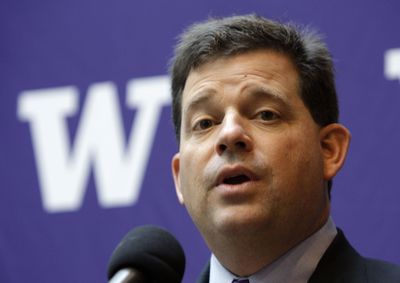Legislators cool to UW stadium upgrade

SEATTLE – The University of Washington has reached a tentative agreement to play its home football games at the Seahawks’ Qwest Field in 2010. That is, if the school is remodeling crumbling Husky Stadium by then.
That’s quite an “if” in the state Legislature, which the UW is lobbying to get public funding for its project.
Monday, the Legislature’s opening day, it sounded like the downtrodden Huskies, 0-12 last season, were more likely to play in the Rose Bowl than get public money to remodel the 88-year-old stadium.
“I’m sorry, this is just not the highest priority that we have to deal with in the Legislature this year,” said House Finance Committee Chairman Ross Hunter, D-Medina.
Huskies athletic director Scott Woodward confirmed Monday the school and the Seahawks have a tentative plan to share the NFL team’s stadium next season, after the UW determined playing through renovations at Husky Stadium would be too disruptive and expensive.
Woodward said that should renovation take longer than anticipated, the Seahawks would be fine with the Huskies playing 2011 at Qwest Field, too.
“We don’t have anything in writing, but we have a verbal agreement to make this work and make this happen,” Woodward said after talks with Seahawks chief executive Tod Leiweke.
Washington has played at Qwest Field once, as the “visiting” team to begin the 2005 season against Air Force. The Seahawks played their home schedules in 2000 and ’01 at Husky Stadium while Qwest Field was being built.
A Seahawks spokesman downplayed the new agreement, which was first reported by the Seattle Times, saying the team has had only “informal discussions” with Washington.
The prevailing mood in Olympia tramples the idea.
For roughly the last year, the university has been using respected former Gov. Dan Evans to seek state authorization to use $150 million of taxpayer money to remodel the oldest venue in the Pac-10, one the school says is dangerously outdated for earthquake preparedness, American Disabilities Act standards, luxury suites and modern fan comforts.
Hunter said there has been no substantial action on the stadium plan.
While raising private and internal dollars for the other half of its estimated $300 million project, the university is preparing to ask the Legislature during its current regular session for permission to seek King County’s OK to use taxes currently added onto bills at hotels, rental car outlets and restaurants there.
The Huskies are in a long line.
Seattle wants state authorization to use a similar revenue source to renovate its KeyArena in hopes of attracting an NBA team back to the city.
The Washington State Convention and Trade Center, currently funded almost entirely by a hotel tax in the city, wants to start a $766 million expansion.
And while some Washington State alumni are against state funds for Husky Stadium, the school has no position on the issue. The Cougars are in the midst of a major remodel of their smaller Martin Stadium in Pullman that is being funded entirely with private donations.
All this comes as Gov. Chris Gregoire says the state’s budget deficit is at $5.7 billion, and some lawmakers say it could go to $7 billion soon.
No wonder House Majority Leader Lynn Kessler, D-Hoquiam, said that UW stadium funding is not a high priority for her caucus.
“There are so many huge fish to fry before we get to that discussion,” Kessler said. “We have cuts to our safety net services for the elderly, and people who are mentally ill, and children’s health care – those are going to take a high priority.”
Hunter said he had a brief conversation about the project with Evans, who is leading a UW task force on stadium upgrades, but that’s about it.
Yet Woodward was optimistic his school could get funding approved, that Husky Stadium remodeling would begin soon and the Huskies and Seahawks would be temporary co-tenants again.
“I feel very good about it. I think we’ve done a good job explaining it and making our case,” he said, adding schematics for the project are almost done and “hard costs” for the entire renovation should be ready in 30 days. “The most important thing is the job creation … and we’re going to be shovel-ready. We’re ready to go.”
When asked if, given the bleak economy, the UW should delay its stadium effort, Woodward said: “I really think it’s to the contrary. People are interested in capital projects that are ready and in the queue.
“(This) has nothing to do with operating money for this year, tourism taxes for this year. It would be 2012 hotel-motel, rental car or restaurant taxes. That’s the beauty of the project. We would not be spending sources of revenues until hopefully the bad economic situation is over with.”